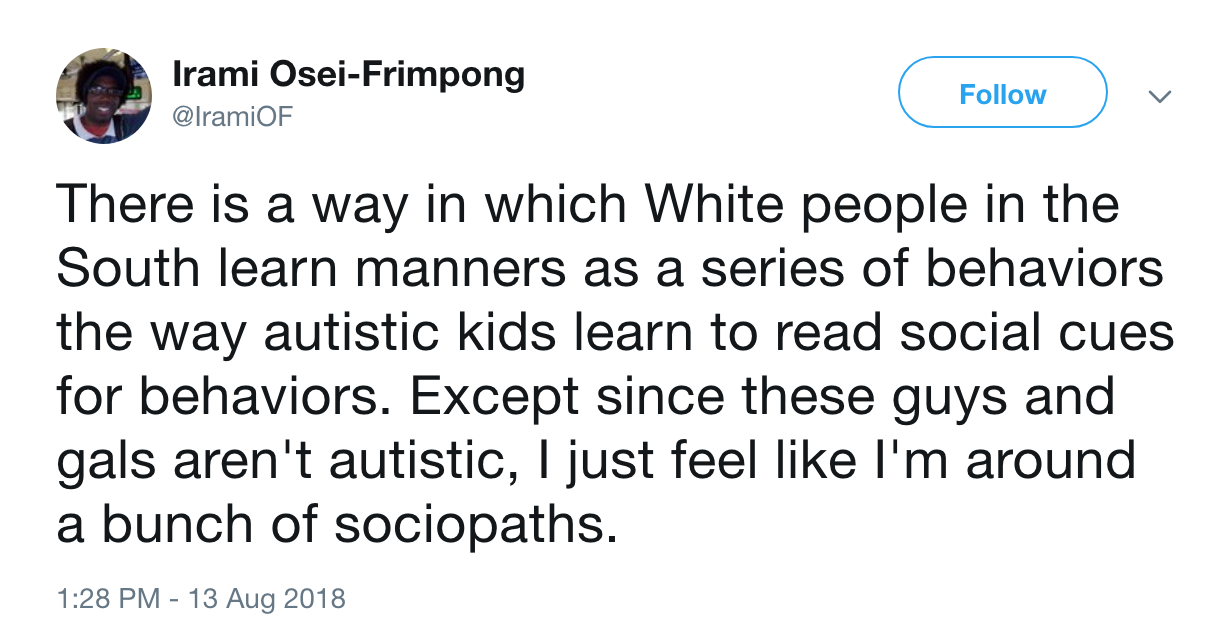
An anti-white tweet can win a seat — at the media’s or academia’s table, seems to be the message. First there was Sarah Jeong, the New York Times editorial-board hire retained despite likening whites to “dogs” and “groveling goblins” on Twitter. Now there’s a guy an eHarmony algorithm might label her perfect match: University of Georgia (UG) teaching assistant Irami Osei-Frimpong, who compared southern whites to “sociopaths.”
But the right prejudice pays today. Aside from Frimpong having a place in the classroom, he was also recently invited to a UG Young Democrats meeting to discuss civil liberties.
While Frimpong’s Twitter feed is replete with anti-white and other radical messages, his August 13 tweet (below) really stands out.

(More on this in a moment.)
Frimpong’s profile lists his research interests as “Political Philosophy” and “Philosophy of Education,” which means that, since he’ll never be qualified for much but professorships, he’ll likely be indoctrinating young minds for years to come. And his instruction’s toxicity is apparent. As Campus Reform reported Thursday:
The TA said that civics classrooms designed to make students comfortable would be “white supremacist” and that he teaches students who receive “white family wealth” and think they earned it by working at Chic-fil-A.
… Osei-Frimpong also argued for normalizing jail sentences, particularly as they pertain to white women.
“All of these white women getting arrested is great,” Osei-Frimpong said. “We need to destigmatize jail, and just see it as something good people do from time to time, like a soldier going to battle. It’s not something you run to, but not something you run away from. (Paraphrasing Gandhi)”
The TA has also taken to Twitter to discuss religion to race, stating that he views Peter as “the whitest Disciple,” noting that Peter “stumbles through all four Gospels and still ends up Pope.”
Twitter is not the only platform through which Osei-Frimpong espouses his views. The TA compared President Donald Trump to an “old-timey chemo that kills the cancer and usually the host” and [criticized] “every suburban county in Georgia” by saying “they raise little white supremacists, but the test scores are good.”
While Campus Reform cites a student who labeled Frimpong a “racist,” his group-identity set has that covered. They define “racism” tendentiously so as to exclude any prejudice or behavior that advances their agenda. But that’s nothing new. Far more interesting is the matter of southern manners and sociopathy.
Now, Frimpong is perceiving something quite real that, tragically, he’s unable to correctly interpret. And it warrants an exposition.
The budding professor’s gripe appears to be that white southerners learn manners by rote, sort of like programming data into a robot. So it seems to him as if it’s all just on the surface, a pleasing façade hiding a soulless interior.
Of course, the ideal is to not only display consistently good manners, but for this to reflect a holy inner world, a pure mind and heart. Yet no one is perfect. What about when we’re in a bad mood or feeling under the weather? Should others endure sometimes undeserved rudeness as a consequence?
This will result if we simply react based on the moment’s feelings, a habit making us little better than animals. Manners are a uniquely human behavior set that, among other things, greatly increases the percentage of the time that people treat each other well; for this reason they help reduce conflict.
Yet manners also have transformative power, changing our minds and hearts. As ancient Greek Aristotle put it, “Virtues are formed in man by his doing the actions,” or, as philosopher Will Durant summed up, “We are what we repeatedly do. Excellence, then is not an act but a habit.” As we do right habitually, we often begin realizing something: It feels better to be good than to be bad. Then we may start to want to be good.
Moreover, how else can you teach children? Note that as with everyone else, southerners would “learn manners” as kids. Now, ironic here given Frimpong’s comments is that some have claimed, as a Cracked headline goes, “[All] Babies Are Sociopaths (According to Science).” This may or may not be true, but for sure is that babies are born uncivilized and must undergo moral formation. How is this accomplished?
Deep philosophical arguments mean nothing to toddlers. As famed psychologist Erik Erikson pointed out via his “stages of psychosocial development,” a child in an early stage of such development only understands that something is wrong if he gets punished for it. Not yet having much of a moral compass (if one at all), this new moral manchild must be built as is a structural-steel edifice: The framework is forged first; the more complex interior construction comes later.
That is to say, you inculcate the child — programming him, in a way — with proper behavior patterns. Manners are a big part of this. If you in addition set good examples, then over time it will help transform his heart and mind, as mentioned earlier.
Eighteenth-century Irish statesman and political theorist Edmund Burke made this point, and more, beautifully. He wrote:
Manners are of more importance than laws. Upon them in a great measure, the Laws depend. The Law touches us but here and there, and now and then. Manners are what vex or soothe, corrupt or purify, exalt or debase, barbarize or refine us, by a constant, steady, uniform, insensible operation, like that of the air we breathe in. They give their whole form and color to our lives. According to their quality, they aid morals, they supply them, or they totally destroy them.
Quite true. Yet given the above, perhaps it’s not surprising that as we destroy morals and manners, we’re replacing them with laws — and bad ones at that.
Photo: kaipong/iStock/Getty Images Plus



